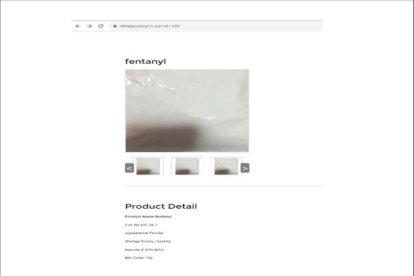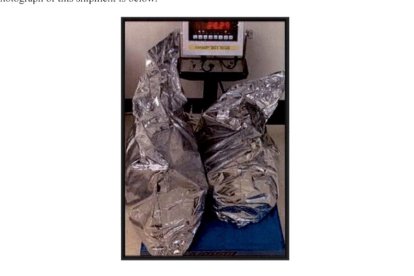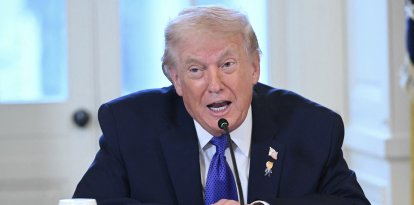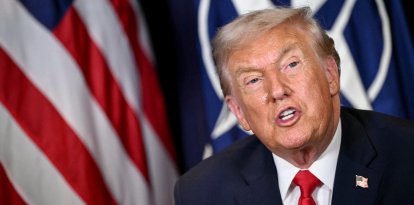ANALYSIS
Why is Trump targeting China over the fentanyl crisis?
Authorities have pointed out for years that individuals and companies on Chinese soil are involved in both the production and the laundering of funds related to the trafficking of the deadly opioid.

Drug users on the streets of Oregon
In his first round of tariffs, Trump targeted Canada, Mexico and China. According to the president's own explanations, one of the reasons for going after the three nations was their connection to the fentanyl crisis on U.S. soil.
Both the country's northern and southern neighbors are accused by the president of allowing the passage of narcotics across their borders with the United States. Regarding Mexico, he added the accusation of having an "intolerable alliance" with drug cartels (President Claudia Sheinbaum struck back, berating Washington for not stopping criminal groups on its own territory or taking charge of consumption).
Despite more than 7,000 miles of Pacific Ocean between China and the United States, Washington claims that Beijing has become a key intermediary in the flow of fentanyl, as much as Mexico and Canada.
The accusation is not novel. Experts, members of Congress and previous governments have recognized China's role for years. Among them is former President Joe Biden. In October, he imposed sanctions against dozens of entities and individuals based in China for this reason. In November, he pledged with Xi Jinping, while shaking hands in San Francisco, to continue the dialogue on the issue.
Independent and government investigations indicate that companies and individuals in China are responsible for two links in the trafficking chain of the synthetic opioid that killed more than 70,000 Americans: money laundering and production of raw materials.
China as a 'bank'
"Chinese banks are processing tens of millions of dollars in transactions for drug traffickers," explained Director of the Foundation for Defense of Democracies Anthony Ruggiero to the Congressional Subcommittee on Health and Financial Services. This accusation includes "the largest banks in China."
To understand how Chinese organizations broker these transactions, one has to follow the paper trail. Former DEA agent Christopher Urben explained before the same committee that there are drug distributors receiving dollars from American clients on a daily basis in the United States.
Still in North America, those distributors give part of their profits to money brokers, who sell that cash to Chinese customers in need of local currency (dollars) for their expenses. These span all kinds of expenses, from paying college tuition to buying property to gambling.
"The Chinese customers pay in China for the cash they receive in the United States," the expert continued. In this way, the money enters the Chinese banking system. Chinese launderers then use these funds to obtain "goods to export to Mexico or South America."
These goods are transported and sold by Chinese intermediaries located in Mexico. Once they have the pesos, the Mexican currency, these middlemen pay the narco gangs.
Why is the system so effective?
There is no international movement of funds. The dollars don't leave the United States, the pesos don't leave Mexico and the yuan don't leave China. This "minimizes the movement of funds," in Urben's words.
In addition, the former DEA agent adds that this system "takes advantage of increasing volume of trade with China and the existence of capital flight control." As increasing Chinese activity in the United States combines with its own government regulations that make it difficult to obtain dollars legally, these intermediary organizations ensure "a constant stream of customers for these funds."
"Chinese laundering organizations have made the cartels richer, more efficient and more deadly."
'WeTraffick'
The social network WeChat is indispensable to these operations, experts say. Foreign launderers use it both to advertise their services and to contact clients. As WeChat is an encrypted network, U.S. law enforcement has difficulty accessing the platform's conversations.
Who does have access is the Chinese Communist Party. According to various reports, including an analysis by The Citizen Lab and complaints from various organizations, the Chinese surveillance apparatus monitors and censors activity on WeChat.
That's another reason why U.S. authorities accuse Beijing of being aware of how the laundering works.
China as a 'laboratory'
In the world's second most populous country, not only is laundering taking place, the drug's components are also being produced. At the beginning of last year, the Department of Justice filed charges against Chinese laboratories that produced precursors of fentanyl, i.e. its "raw materials."
It is worth noting that the producers identified by the authorities often offer a wide range of ingredients for various illicit substances: methamphetamines, MDMA, tranq, etc. These are trafficked from Asia to Mexico, where the drugs are manufactured. Even there, in the Americas, there are Chinese chemists collaborating with Mexican organizations, according to Hudson Institute researcher David Asher.
In a report early last year, several laboratories were included in an operation targeting the Sinaloa Cartel. Deputy Attorney General Lisa O. Monaco explained that they had included "every element of the Sinaloa Cartel's trafficking network": "from the chemical companies in China that spawn fentanyl precursors, to the illicit labs that produce the poison, to the networks and money launderers and murderers that facilitate its distribution."
This was not the only complaint against chemical companies on Chinese soil. One of the companies singled out was the biotechnology company Henan Ruijiu, from the city of Zhengzhou, capital of Henan province. According to court documents, the company "openly advertises the sale of chemicals to the United States and Mexico on its website and through its employees," a practice described by analysts as frequent.

Image from a DOJ complaint against Henan Ruijiu showing the sale of fentanyl on its website.
Hanhong Medicine Technology, another company under the investigators' spotlight, reportedly sells its products on a Mexican website direct to consumers in that country. From Wuhan, Hubei province, it allegedly made air shipments to a client identified as a drug trafficker of the Sinaloa Cartel: 25 kilos of the precursor 1-Boc-4-P in November 2021, another 50 in March 202 and another 25 more in June of that year.
Sometimes, they offer the service of shipping directly to the United States. Hanhong reportedly sold to a distributor in Pennsylvania. Upon searching his home, agents found about 1,500 contraband pills. Another of these producers is Henan Ruijiu. After promising "the biggest discount" to an undercover agent, a company representative assured that it was possible to make air deliveries to U.S. coordinates. To do so, fake shipping labels would be used to evade customs authorities: "We will not be stopped by customs."

Shipment with a fentanyl precursor received by an undercover agent in Broward County, Fla.


























